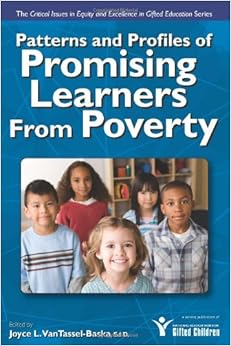The focus of this book study is Patterns and Profiles of Promising Learners From Poverty by Joyce L. VanTassel-Baska. Participants are responsible for purchasing their own books.
Patterns and Profiles of Promising Learners From Poverty covers a variety of topics pertinent to the education of students from low-income families, including the role of culture in education, curriculum for promising learners, psychosocial stressors that affect these learners, professional development for teachers of low-income students, and state policy implementation to affect these students' educations. Chapters look specifically at several types of learners from poverty, including rural and urban-area students, African American students, Caucasian students, and high nonverbal, low verbal students.
Amazon.com,. (2015). Patterns and Profiles of Promising Learners From Poverty (The Critical Issues in Equity and Excellence in Gifted Education): Joyce VanTassel-Baska Ed.D.:
Session 1: Chapters 1-4
Session 2: Chapters 5-7
Session 3: Chapters 8-10
Session 4: Chapters 11-12

